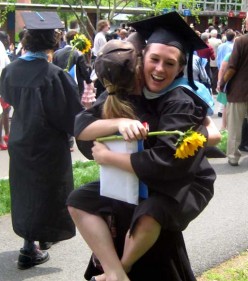
(Rapture in South Hadley, MA, 22 May 2011. Photo Socotra.)
Apparently the Powers That Be miscalculated The Rapture. Simple mistake- the World will end on October 21st now, so we will get the whole pool season in without incident. I marked it on my Microsoft Outlook calendar so I won’t forget and tried to plow through the Times and the papers strewn around the desk left over from the trip to the other Rapture, the real one.
It was impressive, and the best Commencement I have attended. Maybe it was the nature of the institution. I confess to a little ambivalence about my feminism. Not in commitment to equality, mind you, or the realization that there are plenty of women smarter than I will ever be, and more than a bunch who could kick my ass if it came to that. Plus, anyone who had a maternal example of brilliance and beauty in the person of my mother could plausibly deny the fundamental equality of the genders.
Still, as you know, there were some awkward moments in the Great Change that came along with the integration of women in society, and they are not done yet. A friend of mine said with more than a trace of bitterness that it was still easier for a woman in US to get things done with some large Doof at her side.
So there is work still to be done, and I am evolving along with the nation. I came to my personal version of feminism with an epiphany that followed 9/11. I was attempting to re-invent my job of the moment in a manner that might contribute to squashing the jihadi cockroaches, and eventually came to the realization that there was not a great deal I could do to instigate a Reformation in Islam akin to that in the West that permitted a civil social society to evolve over time.
I was horrified by what some regions of the world do to half their number, from slavery and mutilation through simple brutal and relentless subjugation.
The one thought I had, and have today, is that the empowerment of women is the key to any social change. As we watch in bewilderment the collision of technology with social change in the Arab Spring, I find both hope and despair.
The President’s big speech last week to re-boot US policy is a case in point. Mr. Obama did not mention the House of Saudi even in passing. Oil politics has its own imperative, of course, and I still bridle at the image of the American President bowing to Abdullah bin Abdul-Aziz Al Saud, King of Saudi and Custodian of the Two Holy Mosques.
I read with interest this morning that the King’s men detained a woman named Manal al-Sharif for up to five days for the crime of “disturbing public order and inciting public opinion by twice driving and automobile.” Ms. Sharif is running a Facebook and Twitter campaign to encourage women across the kingdom to join a mass protest in June.
I wish her well, and applaud her courage. We ought to do something to show support, though I am not completely sure what that might be except to have Hillary use the bully pulpit of the State Department.
I mean, it is not like this isn’t all going to fall apart anyway, and we ought to go out with our heads up.
But the lingering effects of sexism are still pervasive here in the land of the Free, and my associate thought long and hard about what sort of college she wanted to attend and worked hard to meet the standards at Mt. Holyoke. There she would be free of the lingering shadow of the Patriarchy and compete on an equal basis with her peers. I was lucky enough to be able to look in on how she was doing over the last four years, and the moment of triumph and celebration arrived last weekend.
Calibrated by the Bright Lights of Northampton and Lake Wyloa, and buffeted by the cheerful anarchy on campus, the Sunday Commencement arrived under cotton wool clouds with the prospect of drizzle on the open Gettell Amphitheater on Pageant Green, where the legendary May Day celebrations and graduations are celebrated.
There were contingency plans for a switch to an indoor ceremony, though should that be required it would clearly be an ugly transition and I was prepared to be wet. I was there a little early. Like an hour and a half early, but I had my Kindle and curled up in one of the green Adirondack chairs conveniently scattered on the stately grounds. I wore a light suit, and was on the verge of feeling a chill.
It all worked, though. By the time my associate’s fan club had assembled and found our assigned seats, the clouds first thinned and then opened to blue skies.
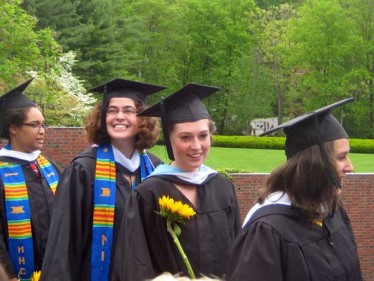
(Entrance. Photo Socotra.)
I put the Kindle and the smart phone down when the procession arrived: six hundred women in black gowns and mortarboards, clutching bright sunflowers, marched in line and at the designated moment, began to file into the amphitheater from both sides of the back row.
They were followed by the faculty in their formal academic robes, multi-colored and brilliantly adorned with cowls of achievement draped down their backs. It is medieval enough in aspect to convince the casual observer that the place was actually Hogwarts.
I skipped my own college graduation- that was part of whatever was in the air back in the early ‘70s, but consider the ritual extremely important for the kids. I have sat in the vastness of Big Ten stadiums to watch my sons achieve their Baccalaureate, but this was something quite unique. Intimate.
Mary Graham Davis, ’65, Chair of the Board of Trustees, made the opening remarks, and President Lynn Pasuerella ’80, gave the welcome before things really started to rock.
Zehra Nabi, ’11, gave the student address that served to set the tone for the ceremony. Zehra was utterly self-possessed before the amphitheater throng, and was by turns witty and insightful about life on campus, the antics of the security force, and the friendly but barbed rivalry with the other Four Colleges that make up The Five of the Pioneer Valley.
I got a kick out of it. My sister Anook went to Hampshire College, one of the first classes enrolled at the iconoclastic free-spirit school. Zehra was riffing in Latin, a neat verbal slight of hand, and attempted to translate the motto of the “organic hemp-oriented enviro retro-hippy” institution into Latin (after skewering Amherst and arch rival Smith). U-Mass got the throw-away line adapted from Caesar: “Veni, Vidi, Vodka.”
It was literate, smooth and archly funny, right down to the campus patois that seemed like gentle rap.
Then they gave away some doctorates. I was steeling myself for an endless drone, but the honorees were impressive and their remarks brief and thoroughly on target to the graduates.
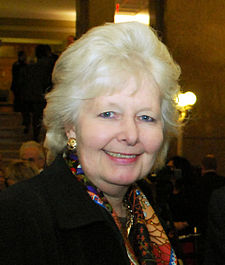
(Judge Marshall. Photo Supreme Court of Massachusetts.)
First up was Judge Margaret Marshall, a woman who started out as the South African daughter of a steel executive under the iron rule of Apartheid. Her remarks were pointed. “There was no access to justice in South Africa…There were a few courageous barristers who agreed to represent people charged with political crimes, but, by and large, if you were a black South African, you had no justice. The death penalty was imposed in vastly disproportionate numbers. Many of the offenses were applicable to black South Africans only.” I was impressed by what she did after moving to Boston. After Harvard and Yale, she rose in the legal trade to become the Chief Justice of the Massachusetts Supreme Judicial Court, the oldest appellate court in the hemisphere and the first woman to serve as such in the three full centuries of the court’s history.
I was sensing a trend, and it was a good one. Next up was Nancy Ahlberg Mellor, a Holyoke grad who got married the day after graduation and was fired from her first teaching job a year later for the offense of getting pregnant. She devoted her professional life to teaching, as my Mom did after her kids were old enough to shift for themselves. Ms Mellor specialized in mathematics, teaching famously the children of migrant farm workers in California. While juggling lesson plans, counseling students, and grading papers, she also earned a master’s degree and then her PhD in education. Noting that there were few Latino students in the advanced courses, she founded the Advanced Talent Development Program at the U-C Berkeley and established the Coalinga-Huron-Avenal House to nurture minority kids.
Third honorary degree was presented to the Mangrove Man, a curiosity in this world of women, but there was a reason for his selection as an honoree. The featured speaker was a Dr. Nancy Craven Nussbaum, a philosopher of note who was born into the privileged family of a Philadelphia lawyer father and a mother who specialized in “interior design and homemaker.” Like her fellow speakers, she was very much a product of the Seven Sisters and Ivy system, attending Bryn Mawr and Harvard as she moved to reject her WASP world. She converted to Judaism along the way, during her graduate studies encountered “a tremendous amount of discrimination,” including “sexual harassment,” and “problems getting childcare” for her daughter.
Despite the travail, she became the first women to hold a Harvard Junior Fellowship, though she was denied tenure by the Classics department and elected to strike out in a new direction at Brown, and based on the strength of her writing, became a highly regarded theorist of global justice.
I was getting the theme, and it was pretty cool. She gripped the podium as she spoke, leaning into her message about unequal freedoms. Her distinctive brand of feminism fuses liberal tradition with a radical rethinking of gender relations and relations within the family and the larger society.
She was crisp and professional, and her message was tight and well-crafted. There had been concern that she might have a tendency to expound at length, and there were six-hundred names to be read and six hundred diplomas to be presented.
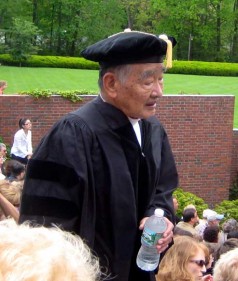
(Dr. Gordon Sato. Photo Socotra.)
Dr. Gordon Hisashi Sato was the third to be honored and his speech was the shortest, but it was the one that struck me most directly. It was not because he was a guy; it was the content of his message. We talked about it afterward, and I think it might be because he took his mission to where it might be needed most. Dr. Sato is popularly known as the Mangrove Man for his work in Africa. He is a cell biologist by training, a detainee of the United States Government as a child in the internment camp of Manzanar, a solider and a fellow of the National Academy of Sciences. He gained his reputation for the discover that “polypeptide factors required for the culture of mammalian cells outside the body are also important regulators of differentiated cell functions and of utility in culture of new types of cells for use in research.”
That would be impressive enough, but he started The Manzanar Project, which attacked poverty, hunger, environmental pollution, and global warming through low tech biotechnological methods applied to salt water deserts, with skills and methodologies that can be transferred to the people of Eritrea and Ethiopia, developing self-sufficiency, village by village.
The base of the support system centers on development of mangrove forests along the Red Sea coastline. The trees perform multiple functions, and taken with Dr. Sato’s earlier developments in food chain generation for aquaculture, the mangrove forests provide a land and sea based economy to meet local needs and an seafood export market.
Remarkable stuff, akin to the micro-lending that could, in time, change the role of women in the third world. Mangrove Man is providing jobs for both men and women, and thus he is beginning the slow process of changing a world in which half the population has no rights whatsoever.
That was the thrust of his brief remarks, and maybe why the coincidence with my earlier epiphany made it so powerful.
Anyway, the speeches out of the way, the parade of graduates across the podium commenced. We calculated that four graduates per minute crossed the stage, and coincidentally, with the cost of tuition, each minute represented a million dollars of education, and with a “seven inning stretch” the procession took two and a half hours.
It was actually pretty cool, what with the opportunity to cheer for the Summa Cum Laudes and the bewildering diversity of the names and faces, and of course, the opportunity to go nuts for The Girl.
Gladys Moore closed the ceremony out, as is appropriate for the Dean of Religious and Spiritual Life, and Director of Diversity and Inclusion.
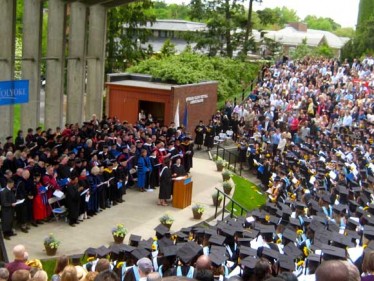
(Alma Mater. Photo Socotra.)
Then, from the ranks of the mort boarded and freshly minted alumna, Emilie Coakley, Gerlisa Garrett and Samantha Martin rose to advance to the podium. With pitch-pipe precision, they launched into the alma mater. It is a pretty song, but later, our graduate informed us there is an anti-alma mater that is even more fun:
Oh, Mount Holyoke, we pay thee tuition,
In the fervour of youth that’s gone wrong,
Each year it gets higher and higher,
My God, alma mater, how long?
So from barroom to bedroom we stagger,
And united in free love for all,
Our drinks are too strong and our morals gone,
Mount Holyoke what’s happening to me?
Mount Holyoke what’s happening to me?
Through the heart of a new night of papers
Breathes the scent of a dinner that died
For what we have written we’re thankful
But we wish that our brains were not fried
So when soft in the east the sun rises
And we realize that we’re out of time
To classes we run swearing once again
Earlier, next time you’ll see,
Yes earlier, next time you’ll see.
There was a box lunch afterward on the lawn as everyone recovered from the rapture with a lot of posing and laughing.
Then it was time for me to commence a journey. I found myself eventually turning-in back the piece of crap Camry to the Hertz people in Hartford, passing through security without event, and back in a little jet headed for the capital out of Bradley International.
TSA searched my bag when they had it in their custody, but I didn’t care. I don’t think they took anything. Jiggs and Milla called to invite me to dinner as I motored in the Hubrismobile back to the city, and damned if a home-cooked dinner out wasn’t a bad way to finish the weekend.
The Big Pink pool opens this Saturday. Onward, to summer!
Editor’s Note: I got calls from my Ivy-League pals about daring to call Mt. Holyoke an “Ivy League school.” The Ivies are sensitive about that, and they specifically referenced Mary Lyon’s institution as being one of the “Seven Sisters,” the sorority circuit of ultra-exclusive schools.
They are, of course, smart guys, and quite correct. But as a land-grant sort of guy, I think it is ivy that is on the buildings in South Hadley, and that is close enough for government work.
The Sister Colleges were all founded between 1837 and 1889. Four are in Massachusetts, two in New York and one in Pennsylvania, roughly mirroring the Northeastern orientation of a younger America. In alphabetical order, they were Barnard, Bryn Mawr, Mt. Holyoke, Radcliffe, Smith, Vassar and Wellesley. In recent times, the Seven have become Five. Quirky and independent Vassar went co-ed in 1969, and Radcliffe elected to merge with the Harvard system and is now a Department of Women’s Studies in the Cambridge complex.
Thus, it is as accurate to describe the Sisters as “ivy” as it is for the graduates of Brown, Columbia, Cornell, Dartmouth, Harvard, Princeton, Penn and Yale. Annapolis, West Point and Rutgers have credentials and lineage that at one time or another made them candidates for the inclusion in the select group, all of which were at one time exclusively male, and all of which are now coed.
Tomorrow: Damage Assessment continues
Copyright 2011 Vic Socotra
www.vicsocotra.com
